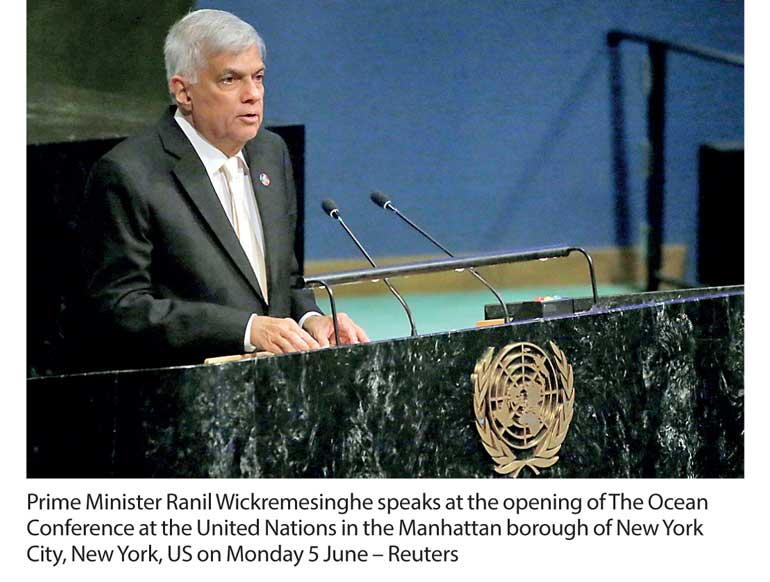Friday Feb 20, 2026
Friday Feb 20, 2026
Wednesday, 7 June 2017 00:10 - - {{hitsCtrl.values.hits}}
 Despite a definite increase in public awareness, the world still has a long way to go to reach optimum levels of global environmental sustainability, Prime Minister Ranil Wickremesinghe told a United Nations sustainability conference in New York on Monday.
Despite a definite increase in public awareness, the world still has a long way to go to reach optimum levels of global environmental sustainability, Prime Minister Ranil Wickremesinghe told a United Nations sustainability conference in New York on Monday.
Speaking at the United Nations Conference to Support the Implementation of Sustainable Development Goal 14 for the conservation and sustainable use of the oceans, seas and marine resources for sustainable development, Wickremesinghe, while appreciative of the collective international efforts to define and correct the depredations of humankind on the planet, said it is a relatively recent effort and more needs to be done.
“Since [the United Nations Conference on the Human Environment in Stockholm and the Stockholm Declaration in 1972], we have made much progress in recognising the environment and its protection as the responsibility of all nations. We have largely accepted the connection between ecological management and the human condition. We have had many conferences, created many institutions. Public awareness and concern about the environment is wider than at any time in history. Yet with all these developments, we have still a long way to go to reach the optimum level of global environmental sustainability,” he said.
The oceans constitute about 70% of the earth’s surface and contain 97% of the earth’s water, said the Prime Minister, adding that if progress was not made on the oceans, the seas and maritime resources, all other environmental efforts would be made difficult, if not impossible, to achieve.
“In many ways then, this has vital significance for the future of humankind. The condition of the oceans, so well described in the concept papers and the discussions of delegates, enhance the urgency of our task,” he said.
In his speech, Wickremesinghe highlighted his Government’s emphasis on funding sources. Sustainable financing is needed, he said, in addition to sustainable programs for commitments to be a reality.
“Alongside corrective measures and technical developments, we need to create a sustainable ocean economy, new blue industries including off-shore renewables, marine technologies, aqua cultures, clean-up and transition activities. Government financing and philanthropic support will probably be insufficient and we will have to encourage creative private-public partnerships and other means to unlock commercial capital. These are ways in which we can mobilise new stakeholders and collaborators whose support will help ensure broader constituency for our endeavours,” said Wickremesinghe.
The Prime Minister also touched on the topic of navigation in Sri Lankan waters, drawing a connection between freedom of movement and economic progress.
“My Government and I personally have urged the adoption of measures related to the freedom of navigation in the Indian Ocean. We strongly believe that such measures will help to initiate a stable zone of economic progress that can eventually embrace larger ocean areas and will provide the stability that accelerates rapid environment improvement. Environmental interconnectivity can provide an opportunity for peacekeeping, peacemaking and development that will bring multiple benefits to several regions in and around South and Southeast Asia and the Eastern Pacific Ocean,” he said.
Premier Wickremesinghe also made reference to the recent floods that wreaked havoc in Sri Lanka last month, highlighting the disastrous effects of climate change on island nations.
“In the past decade or so, Sri Lanka has been devastated by nature driven tragedies. Floods and landslides of 2003, the massive tsunami of 2004 and other disasters have wrecked my country. Right now, as I speak, we are inundated by savage floods causing hundreds of deaths and hundreds of thousands of displaced people. Human misery is unbelievable. We are grateful to the international community, the United Nations and its agencies and the Secretary General, and so many generous contributions of assistance. But all this underlines how helpless we are in the face of environmentally sourced disasters,” he said.
Wickremesinghe also spoke of the accumulation of plastic waste in the world’s oceans, highlighting the importance of cleansing the seas that provide employment, food and avenues of trade and commerce for coastal communities everywhere.
The Prime Minister was vocal about his Government’s endorsement of the Paris Climate Agreement, which US President Donald Trump famously pulled out of earlier this week.
“We are deeply conscious that our fate is not in our hands alone. This is especially why we are so supportive of international environment actions. We strongly endorse the Paris Climate Agreement which was ratified on our behalf by Sri Lanka’s President His Excellency Maithripala Sirisena. We affirm our commitment to the FAO International Plan of Action and are implementing the Sri Lanka National Plan of Action on Illegal, Unreported and Unregulated Fishing. We consistently stand behind every significant international environmental agreement, especially the Sustainable Development Goals and the UN Framework Convention on Climate Change. It is our hope that the collective interest embodied in these instruments will be the basis for a new consensus,” he said.
For 72 years, the Premier went on to say, the United Nations has worked, with varying degrees of success, on the global agenda as it has evolved. “The here and now, the immediacies of the world, largely engage the attention of the UN. Although it tries, there is understandably not much space available to focus on the future. But surely part of our task is also to shape Planet Earth so that we will leave a heritage that generations to come will welcome,” he said.
“Our efforts in the environmental area fulfil that obligation. That is why I strongly endorse the objectives of this conference and hope that your deliberations will create practical, prompt and inclusive results. Today’s urgencies and our legacy for the future demand no less,” he added.